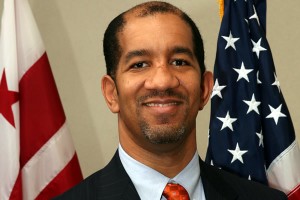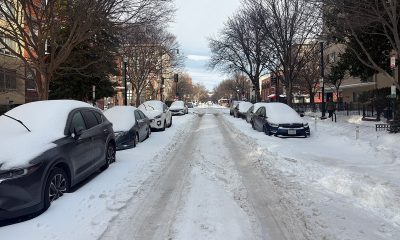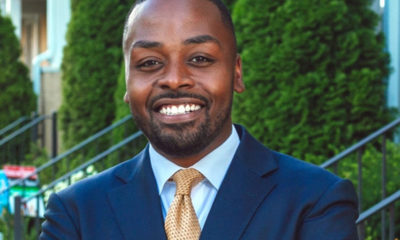Local
Biddle beats out Vincent Orange for interim post
Ward 4 school board member Sekou Biddle, who won an interim appointment to the D.C. City Council last week, says he’s a strong supporter of LGBT rights, including same-sex marriage.
Biddle, 39, beat former City Council member Vincent Orange (D-Ward 5) and four other Democratic candidates who competed for the interim appointment before the 80-member D.C. Democratic State Committee, which makes interim Counsel appointments.
“I support same-sex marriage,” Biddle told the Blade after the vote. “I think it’s an indication of the kind of city that we have. It’s what makes us, in my opinion, a top-flight, world-class city that we have that level of respect for human and civil rights.”
Biddle will face off against Orange and other candidates expected to enter the race from all political parties in a special citywide election scheduled for April 26.
He was expected to take office immediately in his temporary Council appointment for a seat made vacant after Council member Kwame Brown (D-At-Large) won election as City Council Chairman.
Before getting elected to the school board, Biddle began his career as a classroom teacher for eight years. He later served in leadership positions in education advocacy organizations, including his current post as executive director of the group Jumpstart.
Last week’s vote by the State Committee came after each of the candidates spoke before the committee and an overflowing crowd that gathered in a meeting room at the Democratic National Committee headquarters on Capitol Hill.
The Gertrude Stein Democratic Club, the city’s largest LGBT political group, endorsed Biddle in his race for the school board, where he has served since 2007.
Three Stein Club members who also are members of the D.C. Democratic State Committee endorsed and campaigned for Biddle in his quest for the committee’s appointment. The three are Jeffrey Richardson, the Stein Club president; Lateefah Williams, the club’s vice president for legislation and political affairs; and Alexandra Beninda, the club treasurer.
He also received the endorsement of Brown, who beat Orange in the hotly contested race in November for the Council chair race. At least three other Council members – Mary Cheh (D-Ward 3), Harry Thomas (D-Ward 5), and Marion Barry (D-Ward 8) also endorsed Biddle.
Mayor Vincent Gray remained neutral in the contest but some of his top political operatives backed Biddle. This prompted many political observers to conclude that the city’s political establishment had shifted its support from Orange – who was considered the frontrunner just two weeks ago – to Biddle.
Orange came out strongly against same-sex marriage during his unsuccessful race for mayor in 2006. When he ran against Brown for the Council chair seat last year he announced he had changed his position to support the city’s same-sex marriage law. But he was less clear about whether he would support or oppose holding a voter initiative seeking to overturn the marriage equality law, which took effect last March.
It took three rounds of voting for Biddle to nail down his victory over Orange Thursday night. With 74 of the 80 State Committee members present to vote, Biddle won on the third round by a vote of 40 to 31. Three ballots cast by committee members were disqualified because they voted for one of the other candidates that were eliminated after the first round of voting.
Only Biddle, Orange and candidate Stanley Mayes, a Ward 1 political activist, received any votes in the six-candidate race.
Many of the observers at the State Committee meeting were looking toward gay Council member David Catania (I-At-Large) as a possible predictor of what might happen in the April special election.
Catania stunned the city’s political establishment in 1997 when, running as a Republican, he defeated Democratic frontrunner Arrington Dixon in a special election to win his at-large Council seat.
Just 7 percent of the city’s registered voters turned out for the special election. But gays and Republican voters turned out in force, giving Catania his margin of victory over Dixon, a former City Council chairman who some observers said was overly complacent in his campaign.
Catania won re-election to a full term the following year and has retained his seat since that time. He withdrew from the Republican Party in 2004 to become an independent after the GOP and President George W. Bush embraced a constitutional amendment to ban same-sex marriage.
Some local political pundits say pro-gay Republican Patrick Mara, who won election in November to the school board from Ward 1, could be the next “Catania” in the April special election. With a low voter turnout and support from Republicans and gays, among other groups, Mara supporters say he has a shot at winning. He has yet to announce whether he plans to run, although insiders believe he will enter the race.
Catania unofficially backed Mara when Mara ran against and defeated former Republican Council member Carol Schwartz two years ago in the Republican primary. Mara lost the general election to Democrat turned independent Michael Brown in the general election. As a friend of Mara’s, some observers are wondering if Catania will throw his support and political organization behind Mara, with the possibility of Mara coming out ahead if Biddle and Orange split the Democratic vote.
Some gays, including David Mariner, executive director of the D.C. LGBT community center, backed Orange in last year’s council chair race, saying Orange has come around to support LGBT issues and was more qualified as an attorney and accountant to address the city’s budget and economic development issues. Mariner said he has yet to decide whom to support in the April special election.
Ben Young, a spokesperson for Catania, said Catania has no comment at the present time on the upcoming Council special election and the potential candidates that might run in the race.
Richardson of the Stein Club said the comparison between Catania and Mara would not likely apply in this year’s special election because Biddle is expected to run a vigorous campaign and line up support from large numbers of gay voters.
Like Biddle, Mara supports same-sex marriage and has expressed strong support for all other LGBT-related issues.
Biddle told the Blade that his political ties to the LGBT community are strong.
“In terms of politics and endorsements, I got my start in the LGBT community,” he said. “When I ran in 2007 for the Board of Education, the Stein Club was the first one to endorse me, and that gave my candidacy a lot of momentum and visibility. I’ve built a solid relationship since I’ve been in office and I think a level of trust.”
He said he considers himself a “progressive” on a wide range of city issues and hopes to draw support from all sections of the city.
District of Columbia
D.C. Black Pride theme, performers announced at ‘Speakeasy’
Durand Bernarr to headline 2026 programming

The Center for Black Equity held its 2026 DC Black Pride Theme Reveal event at Union Stage on Monday. The evening, a “Speakeasy Happy Hour,” was hosted by Anthony Oakes and featured performances by Lolita Leopard and Keith Angelo. The Center for Black Equity organizes DC Black Pride.
Kenya Hutton, Center for Black Equity president and CEO, spoke following the performances by Leopard and Angelo. Hutton announced this year’s theme for DC Black Pride: “New Black Renaissance.”
Performers for 2026 DC Black Pride were announced to be Bang Garcon, Be Steadwell, Jay Columbus, Bennu Byrd, Rue Pratt and Akeem Woods.
Singer-songwriter Durand Bernarr was announced as the headliner for the 2026 festivities. Bernerr gave brief remarks through a video played on the screen at the stage.
DC Black Pride is scheduled for May 22-25. For more information on DC Black Pride, visit dcblackpride.org.
Virginia
Arlington LGBTQ bar Freddie’s celebrates 25th anniversary
Owner asks public to support D.C.-area gay bars

An overflowing crowd turned out Sunday night, March 1, for the 25th anniversary celebration of Freddie’s Beach Bar, the LGBTQ bar and restaurant located in the Crystal City section of Arlington, Va.
The celebration began as longtime patrons sitting at tables and at the bar ordered drinks, snacks, and full meals as several of Freddie’s well-known drag queens performed on a decorated stage.
Roland Watkins, an official with Equality NoVa, an LGBTQ advocacy organization based in the Northern Virginia areas of Arlington, Alexandria, and Fairfax County, next told the gathering about the history of Freddie’s Beach Bar and the role he said that owner Freddie Lutz has played in broadening the bar’s role into a community gathering place.
“Twenty-five years ago, opening a gay bar in Arlington was not a given,” Watkins told the crowd from the stage. “It took courage, convincing, and a deep belief that our community belongs openly, visibly, and proudly,” he said. “And that belief came from Freddie.”
Watkins and others familiar with Freddie’s noted that under Lutz’s leadership and support from his staff, Freddie’s provided support and a gathering place for LGBTQ organizations and a place where Virginia elected officials, and candidates running for public office, came to express their support for the LGBTQ community.
“Over the past 25 years, Freddie’s has become more than a bar,” Watkins said. “It has become a community maker.”
Lutz, who spoke next, said he was moved by the outpouring of support from long-time customers. “Thank you all so much for coming tonight and thank you all so much for your support over the past 25 years,” he said. “I can’t tell you how much that means to me and how much it’s kept me going.”
But Lutz then said Freddie’s, like many other D.C. area gay bars, continues to face economic hard times that he said began during the COVID pandemic. He noted that fewer customers are coming to Freddie’s in recent years, with a significant drop in patronage for his once lucrative weekend buffet brunches.
“So, I don’t want to be the daddy downer on my 25-year anniversary,” he said. “But this was actually the worst year we’ve ever had,” he added. “And I guess what I’m asking is please help us out. Not just me, but all the gay bars in the area.” He added, “I’m reaching out and I’m appealing to you not to forget the gay bars.”
Lutz received loud, prolonged applause, with many customers hugging him as he walked off the stage.

In an official statement released at the reveal event Capital Pride Alliance described its just announced 2026 Pride theme of “Exist, Resist, Have the Audacity” as a “bold declaration affirming the presence, resilience, and courage of LGBTQ+ people around the world.”
The statement adds, “Grounded in the undeniable truth that our existence is not up for debate, this year’s theme calls on the community to live loudly and proudly, stand firm against injustice and erasure, and embody the collective strength that has always defined the LGBTQ+ community.”
In a reference to the impact of the hostile political climate, the statement says, “In a time when LGBTQ+ rights and history continue to face challenges, especially in our Nation’s Capital, where policy and public discourse shape the future of our country, together, we must ensure that our voices are visible, heard, and unapologetically centered.”
The statement also quotes Capital Pride Alliance CEO and President Ryan Bos’s message at the Reveal event: “This year’s theme is both a declaration and a demand,” Bos said. “Exist, Resist, Have Audacity! reflects the resilience of our community and our responsibility to protect the progress we’ve made. As we look toward our nation’s 250th anniversary, we affirm that LGBTQ+ people have always been and always will be part of the United States’s history, and we will continue shaping its future with strength and resolve,” he concluded.
-

 India4 days ago
India4 days agoActivists push for better counting of transgender Indians in 2026 Census
-

 Advice4 days ago
Advice4 days agoDry January has isolated me from my friends
-

 District of Columbia4 days ago
District of Columbia4 days agoCapital Pride reveals 2026 theme
-

 National4 days ago
National4 days agoAfter layoffs at Advocate, parent company acquires ‘Them’ from Conde Nast



















